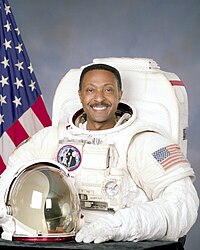Winston Elliott Scott
| Winston Scott | |
|---|---|

|
|
| Country: | United States |
| Organization: | NASA |
| selected on | March 31, 1992 ( 14th NASA Group ) |
| Calls: | 2 space flights |
| Start of the first space flight: |
January 11, 1996 |
| Landing of the last space flight: |
5th December 1997 |
| Time in space: | 24d 14h 35min |
| EVA inserts: | 3 |
| EVA total duration: | 19h 35min |
| retired on | July 31, 1999 |
| Space flights | |
Winston Elliott Scott (born August 6, 1950 in Miami , Florida , USA ) is a retired American astronaut .
Scott received a bachelor's degree in music from Florida State University in 1972 and a master's degree in aerospace engineering from the Naval Postgraduate School in 1980 .
In December 1972, Scott joined the United States Navy , where he trained as a naval aviator and helicopter pilot. From 1974 he was stationed for four years in an anti-submarine helicopter squadron in California. Later he was stationed in Virginia as an F-14 pilot. From 1986 stationings in Florida and Pennsylvania followed. He was also an electrical engineering instructor at Florida Agricultural and Mechanical University and Florida Community College.
Astronaut activity
In March 1992 he was selected by NASA as an astronaut aspirant.
STS-72
On January 11, 1996, Scott flew into space for the first time as a mission specialist on the space shuttle Endeavor . The team captured the Japanese Space Flyer Unit, launched ten months earlier, and suspended the OAST platform for two days. Assembly techniques were simulated during two space exits in order to gain experience for the future international space station .
STS-87
On November 19, 1997 Scott started as a mission specialist with the space shuttle Columbia for the Spacelab mission "United States Microgravity Payload 4". Scott performed two space exits (EVAs) together with Takao Doi . During the first EVA, they caught the SPARTAN research satellite , which had been launched at the beginning of the flight and which had fallen into an uncontrolled tumble. In addition, the so-called AERCam was tested for the first time, an approximately 40 centimeter ball that is equipped with a position control and camera system and can explore structures that are difficult to access. Scott let it float out of the payload bay and Steven Lindsey controlled AERCam by remote control from the cockpit.
According to NASA
In July 1999, Scott retired from NASA and the US Navy and became vice president of student affairs at Florida State University. He then served as director of the Florida Space Authority. He is currently Vice President and Assistant General Manager of Jacobs Engineering's Support Contract at the Johnson Space Center .
Private
Winston Scott is married with two children.
See also
Web links
- Short biography of Winston Elliott Scott at spacefacts.de
- NASA biography of Winston Elliott Scott (PDF)
- Biography of Winston Elliott Scott in the Encyclopedia Astronautica (English)
| personal data | |
|---|---|
| SURNAME | Scott, Winston Elliott |
| BRIEF DESCRIPTION | American astronaut |
| DATE OF BIRTH | August 6, 1950 |
| PLACE OF BIRTH | Miami , Florida, USA |